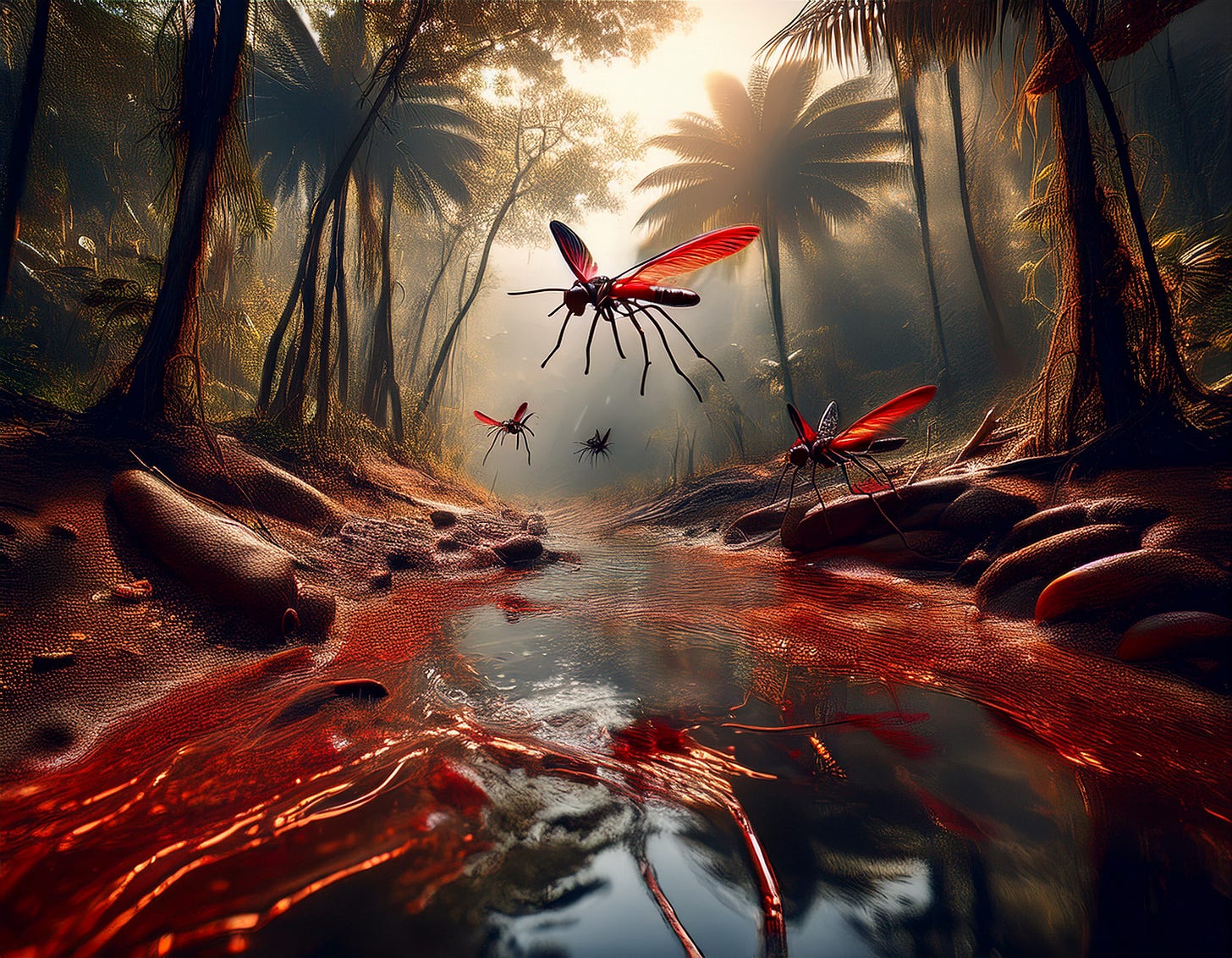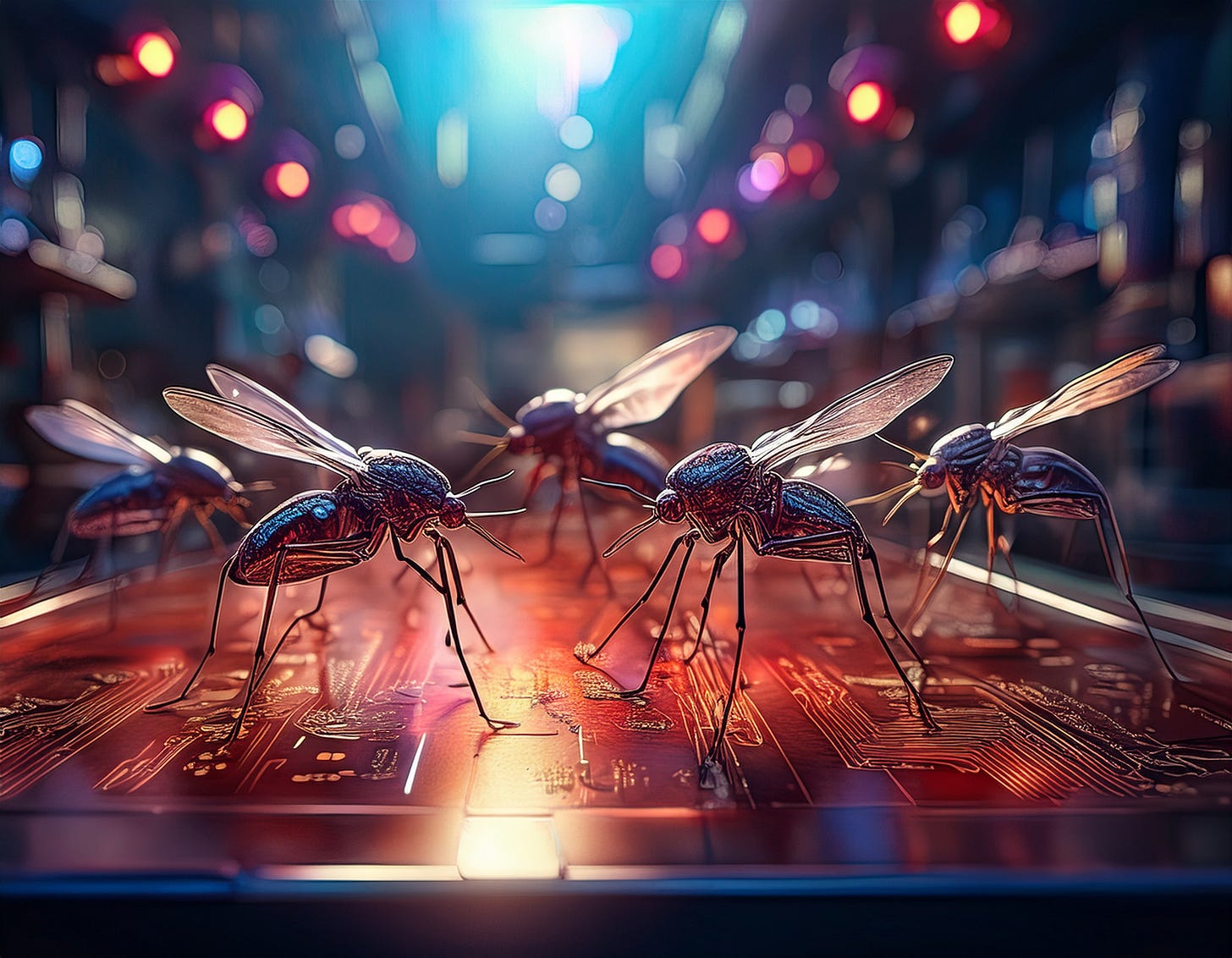URGENT: Deadline 9/6 to Oppose EPA Registration of Google’s Mosquitoes for Release in Hawai‘i
Google LLC is requesting EPA Section 3 registration of their bacteria-infected mosquitoes targeted for release in the Hawaiian Islands
Google is now directly targeting the Hawaiian Islands with their experimental lab-altered mosquitoes, seeking to register their “Debug quinx males” (DQB Males) mosquitoes with the EPA under Section 3 of the Federal Insecticide, Fungicide, and Rodenticide Act (FIFRA). According to EPA docket documents, the original applicant for this registration was Verily Life Sciences, a subsidiary of Google’s parent company Alphabet. Verily is the manufacturer of the mosquitoes currently being released on Maui and Kaua‘i under EPA Section 18 Emergency Exemption. No explanation is given for the change of Section 3 applicant from Verily to Google.
The EPA has opened a limited window of opportunity for the public to comment on this. It is urgent that everyone opposed to these mosquito releases in Hawai‘i send in a comment to the EPA stating opposition to Google’s Section 3 registration request.
The deadline to comment is this Saturday, September 6th, 2025, at 5:59pm Hawai‘i Standard Time.
Please send in your comments by 9/6 in opposition to Google LLC’s EPA Section 3 FIFRA request to register their experimental bacteria-infected “Debug quinx males” (DQB Males) mosquitoes.
Send comments here:
COMMENT on Google’s EPA Section 3 Request to Register Mosquitoes
Sample comment (copy and paste):
I’m opposed to EPA approval of Google LLC’s FIFRA Section 3 registration request for Debug quinx males (DQB Males) Wolbachia-bacteria-infected mosquitoes Docket ID EPA-HQ-OPP-2024-0428. These mosquitoes are an experiment that could harm the health of Hawai‘i’s people, wildlife, and ecosystems. Peer-reviewed studies have shown Wolbachia to cause mosquitoes to become more capable of transmitting avian malaria and West Nile virus (bird and human). Southern house mosquitoes transmit human diseases, including West Nile virus, elephantiasis, encephalitis, and potentially Zika virus. Male mosquitoes transmit bacteria and pathogens to females. Pathogen screenings for these lab-altered mosquitoes are unknown, and that information is being withheld from the public. EPA guidelines allow for the release of thousands of female mosquitoes that bite, breed, and spread disease. There are no known biosecurity protocols for the imported mosquitoes, and no mitigation measures in place if something goes wrong. Population replacement of wild mosquitoes with the lab-altered mosquitoes could cause significant impacts.
The EPA has failed to address tropical disease expert Dr. Lorrin Pang’s serious concerns about horizontal transmission of introduced bacteria, biopesticide wind drift of lab-altered mosquitoes into unintended areas, superinfection of mosquitoes with multiple bacteria strains, increased pathogen infection and disease-spreading capability in mosquitoes, and the experimental nature of the release plan.
No studies have been done to evaluate the direct, indirect, and cumulative impacts of these mosquito releases. Mosquito release agency partners in Hawai‘i have been releasing millions of DQB Males mosquitoes on Maui since 2023 and on Kaua‘i since early this year. These agencies have produced no public data on the results of these releases. These lab-altered southern house mosquitoes, and the Wolbachia bacteria they’re infected with, are life forms, and there is no way for this experimental project to be self-contained. The release of these mosquitoes could cause the extinction of endangered native birds, and it may impact human health.
I’m opposed to the exploitative use of the Hawaiian Islands as testing grounds for the biotech industry. I do not consent to the targeted use of these Debug quinx males (DQB Males) in Hawai‘i, and I oppose Google LLC’s Section 3 registration request.
With no data showing safety or efficacy of the Wolbachia-infected mosquitoes currently being released in Hawai‘i under EPA Section 18 emergency exemption, Google now wants to plow ahead with Section 3 registration of their mosquito product, specifically for release in Hawai‘i. If this registration is allowed to move forward, it won’t be long before the biotech industry starts pushing these mosquitoes for conservation use throughout the country and worldwide and pushing for their use to control mosquitoes in the name of public health.
Following are some important details about Google’s registration request:
Under Section 3 of FIFRA, the EPA can register pesticides or biopesticides for use throughout the United States. The EPA registers some pesticides for more limited use in certain states. Google’s Section 3 registration request documents specify that the “end-use product, ‘Debug quinx males’ (referred to by the alternate brand name: DQB Males), is proposed for use in conservation programs for protection of endangered bird species” and that “the use of ‘Debug quinx males’ in public health programs is prohibited.”
The “DQB Males” mosquitoes currently being released on Maui and Kaua‘i were approved by the EPA under Section 18 of FIFRA, which is called an “emergency exemption.” The Section 18 emergency exemption applicant is the State of Hawai‘i Department of Agriculture (not Google LLC or their sister company Verily Life Sciences). Under Section 18 of FIFRA, the EPA can allow state and federal agencies to permit the unregistered use of a pesticide or biopesticide in a specific geographic area for a limited time if “emergency pest conditions exist.”
Google’s Section 3 application docket documents state that the “EPA is proposing to register one end use product, ‘Debug quinx males,’ containing the new active ingredient Wolbachia pipientis wAlbB (DQB Strain).”
The docket documents state: “Use of ‘Debug quinx males’ is limited to Hawaii.”
According to the Proposed Label for the product, “Debug quinx males (primary brand name), DQB (Debug quinquefasciatus wAlbB) males (alternate brand name), Good Bugs by Debug: Culex quinquefasciatus (alternate brand name),” manufactured by Google LLC, are for aerial release using Google’s Aerial Mosquito Release System – for which Google can enable the initiation of automated releases.
Hawai‘i Unites’ comment opposing Google’s Section 3 registration request was submitted to the EPA on 8/31/25 and can be read in full on our website. Among multiple significant concerns we bring forth are the following:
“The EPA’s Ecological Risk Assessment Biological Evaluation for this product registration request cites a 2024 Kilpatrick et al. study as justification for suggesting that establishment of the wAlbB strain of Wolbachia bacteria in Culex quinquefasciatus mosquitoes in Hawai‘i would be unlikely to present a hazard. Funding for this Kilpatrick et al. study was provided by a contract from Verily Life Sciences, the DQB Males mosquito product manufacturer. Over half of the Kilpatrick et al. study’s authors have stated conflicts of interest. Giulia Fabbri, Paul I. Howell, Austin G. McGowan, Bradley J. White, and Sara N. Mitchell ‘report employment and equity ownership at Verily Life Sciences, a for-profit company developing new technologies for mosquito control.’ ”
“The Proposed Label for this product registration request states that aerial releases of mosquitoes ‘are to be performed using Google’s Aerial Mosquito Release Systems’ and that aerial releases may be initiated ‘automatically by the release equipment.’ The label states: ‘Contact Google for more information on aerial release planning, and to enable automated releases.’ No information is provided detailing the configuration or operation of this release system, nor is any evaluation of the potential adverse impacts of its use provided.”
“The agencies releasing these lab-altered mosquitoes have admitted that the plan does not include monitoring the effects of the experimental mosquitoes on forest birds.”
“These mosquitoes are a dangerous experiment, and the continued release of this insufficiently studied product is a reckless assault on our natural environment. Hawai‘i Unites opposes the exploitative use of sacred lands of the Hawaiian Islands as testing grounds for the profit-motivated biotech industry to execute the mass release of their experimental Wolbachia-bacteria-infected mosquitoes. Conservation efforts must focus on more environmentally sound approaches like habitat and stream flow restoration, which would honor the ‘āina, the culture, and the ancestral connections of the native birds rather than putting them at further risk of extinction. We stand in firm opposition to all actions that dishonor the ‘āina and the ancestors.”
Your voice is urgently needed. Please stand with us and say NO to this escalating agenda targeting our island home. We do not want the EPA to approve Google’s Section 3 registration request for their experimental mosquitoes to be released in Hawai‘i.
Send in comments to the EPA by Saturday, 9/6:
COMMENT on Google’s EPA Section 3 Request to Register Mosquitoes
Hawai‘i Unites’ active case to stop the mosquito releases on Maui and require an Environmental Impact Statement is in the hands of the State Supreme Court. We will know this month if the Supreme Court will accept our case seeking a ruling that our environmental court case be remanded back to the circuit court and go to trial. Your tax-deductible donations support the work that we’re doing and help us raise funds towards our legal fees.
Mahalo,
Tina Lia
Founder
Hawai‘i Unites
HawaiiUnites.org
Hawai‘i Unites is a 501(c)(3) nonprofit organization dedicated to the conservation and protection of our environment and natural resources. Your tax-deductible donations help us to fulfill our mission of honoring and protecting our sacred connection to the natural world.
Report a Mosquito Bite
The State of Hawai‘i and its multi-agency partnership Birds, Not Mosquitoes have been releasing bacteria-infected mosquitoes in East Maui and conducting pilot study releases on Kaua‘i since 2023. As part of our ongoing research and documentation, Hawai‘i Unites has been compiling reports from throughout the islands about unusual mosquito bite reactions. If you’ve been bitten by a mosquito and would like to report the incident, please complete our Mosquito Bite Incident Report.







This is an important testimony to the EPA. There are significant risks that have not been addressed and mahalo Tina for keeping on top of this serious issue.